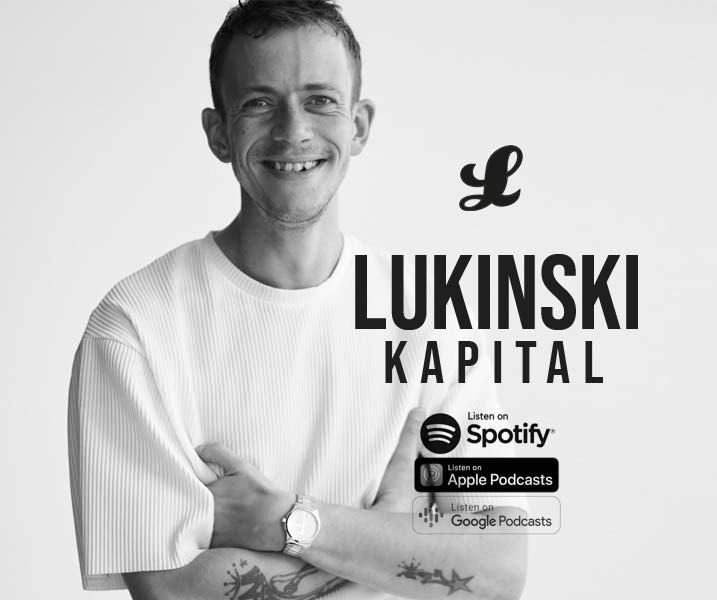Lukinski Kapital: Founding and running a company – podcast on Spotify, Apple, Deezer & Co.
Back at last! My podcast on Spotify, Apple Podcast, Amazon, Google and Deezer. Corona is coming to an end and it’s time for you to start your own business! The launch and kickoff. How much does it cost to start a business? What does it take to start a company? Can anyone start a company? How can I start a small company? From the first steps to tax types, legal forms, capital investments…. Here you will learn the basics of company formation and management.
Podcast for business beginners
We had the first virtual humans walk at a fashion show in Europe. We created virtual avatars at the Berlin Fashion Week for the first time worldwide, especially for a fashion brand. We were guests at Business Insider but also at TV stations like RTL.
Step by step.
The same way you build a business.
My vision is not to establish AI overnight, we want to learn about the different possibilities, play with them, we want to use, develop and combine AI.
Example.
Now on Spotify, Google, Deezer, Apple & Co.
Spotify, Google Podcast, Deezer and on Apple Podcast (formerly iTunes).
Learn business skills, trading and real estate
Learn about the business world together with me. From absolute basics, like the types of companies, the types of taxes, to more complex topics, for example currency trading, trading cryptocurrencies, but also buying real estate, as an investment.
Why is it so important to understand business types? To understand taxes?
You are the architect of your own happiness.
Nobody but you can control (your explicit) business processes (so) intelligently. Controlling does not mean that you do everything. Controlling means that you act responsibly and delegate tasks. If you are the head of the company, you are the person responsible for its success.
You are the leader.
You don’t need to understand everything in detail, but you do need to understand the context. If you don’t know what your team or outsiders are doing, you can never judge whether a decision is good or bad for you and your company.
Don’t be a specialist, be a generalist.
Examples from practice: An insight
Example: Establish a holding company and secure assets
Let’s look directly at a practical example for your first company, your first startup. Have you ever dealt with the “holding model”? Without going into too much detail, you directly found two companies. More precisely, you found a company and this in turn founds a subsidiary company. The profits of your daughter company are then transferred to the parent company. So if your daughter company gets into trouble at some point, your entrepreneurial assets are secured.
9 out of 10 startups fail – in the first 5 years
Did you know that nine out of ten startups fail in the first five years? Once again, 9 out of 10 startups fail in the first five years. What does that mean for you? Imagine you finish school, vocational training, or college and you start with a few friends, you start your own companies. Even with four friends starting up, statistically each of your friends would have to go broke for you to survive as an entrepreneur.
Everyone has to go broke except you – statistically.
This reality check quickly makes young entrepreneurs realize how difficult the entrepreneurial game will be. Accordingly, it is important that you prepare yourself for the challenges.
Never see problems again, but solutions
The fact that you are listening to this podcast is a very good sign that you are interested in the right topics!
Establish a company: Quick and easy
Starting a company is pretty simple. All you need is a little start-up capital, maybe 1000 euros, an appointment with the notary and – simply put – you’re ready to go. You don’t even need the 1000 Euro starting capital, for example if you start your own business, as a businessman or businesswoman. Then 30 Euros, an identity card and an appointment at the Bürgeramt or Gewerbeamt are enough.
You only need start-up capital if your company is to be a “legal entity”. This means, for example, a UG, Unternehmergesellschaft, which later becomes a GmbH, a limited liability company. The big advantage of a legal entity is that you are not liable yourself. At least not in the usual, entrepreneurial activities.
Comparison offer: profit in purchasing
Another basic tip, even if it sounds very simple, always get different comparison quotes. Let’s say you want to build an online store for the products you want to sell in the future. The first online marketing agency will make you an offer of 80,000 euros, the second marketing agency an offer of 170,000 euros and the third marketing agency an offer for only 50,000 euros, with the same scope of services.
Obtaining three different offers alone directly saved 30,000 euros.
From saving, you learn to become rich.
As an entrepreneur, it is always a matter of knowing your options, testing them and playing your cards. No matter whether it is about the company formation, as in our example of the holding structure or the simple obtaining of various comparative offers to save money already in the purchase.
By the way. A very important tip:
In the purchase lies the profit!
Tax structuring = additional wealth creation
Later, when you have a turnover of a few hundred thousand or even millions, tax planning becomes an increasingly important issue for you. Of course you can now say, I’ll get a good tax advisor, I’ll get a financial specialist, but do they really do a good job? Highly paid you notice their mistakes only when you lose money after months or realize after years that millions have become only a few euros. If you don’t know anything about taxes, you won’t be able to oversee their work and therefore won’t be able to judge whether a decision is good or bad for you and your brand.
Income tax (self-employed) or profit in the company
An example from the later tax types. If you are self-employed, alone and without a UG or GmbH, you pay income tax. From an annual income of ~ 9,400 euros, the initial tax rate is 14%. The top tax rate for income from ~ 57,000 euros is then already 42%. You reach this tax rate with a monthly income of 4750 euros.
If you make money work for you, you only pay 25% capital gains tax. Above a certain income, you are almost forced to think about tax planning.
Together we take a look at the types of taxes but also real estate as an investment. Because what do all people have in common when they grow old and wealthy? Real estate. That’s exactly why we will also frequently deal with the topic of real estate as a capital investment.
Real estate as an investment
Real estate as an investment means that you buy a property to rent it out afterwards. The big advantage, if the real estate yield is right, which you will learn later, your tenant pays off your property. So to speak, passive capital accumulation.
Passive wealth accumulation: Financial freedom
Passive wealth creation? Passive income? Exactly now the alarm bells ring at the latest with many, the passive income, financial freedom, exactly that want many!
To be financially free, you need to be financially successful. If you don’t happen to have a million-dollar inheritance waiting for you, the only thing you can do is play the lottery or work hard.
Learn the path to entrepreneurship step by step in my podcast.
Once you understand the subject matter and have gathered knowledge through this podcast, but also through other sources of information, it’s also about marketing. Specifically, performance marketing. If you understand how to build reach and how to convert that reach into customers, then all avenues are open to you. The world is becoming more digital, learn to work with that and play that as your strength, your unfair advantage.
That was Lukinski Capital. The first episode and the prelude to the special: Taxes in Germany.
Now on Spotify, Google, Deezer, Apple & Co.
Spotify, Google Podcast, Deezer and on Apple Podcasts (formerly iTunes).


















